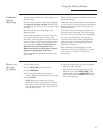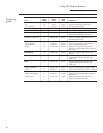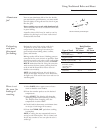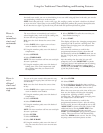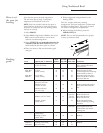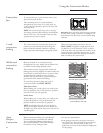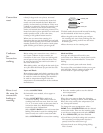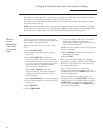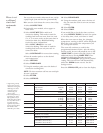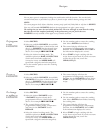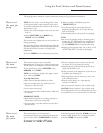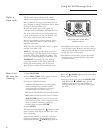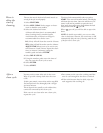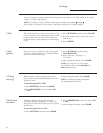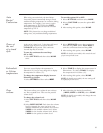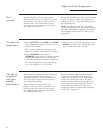
How to set
a delayed
start and
automatic
stop
You can set the oven control to delay-start the oven, cook for
a specific length of time and then turn off automatically.
Make sure the clock shows the correct time of day.
1 Select CONVECTION.
2 On double oven models, select upper or
lower oven.
3 Select CONV MULTI for multi-rack
convection baking. This mode is used for
cooking food items on more than one rack
(i.e., 2, 3 or more racks) at the same time in
convection bake. See Multi-Rack Baking
section for more information.
Select CONV 1-RACK for one rack
convection baking. This mode is used for
cooking food items on only one rack in
convection bake.
Select CONVROAST for convection roasting.
4 Press the number pads to set the desired
oven temperature.
5 Select OPTIONS.
6 Select TIMED BAKE.
7 Using the number pads, enter the desired
convection cooking time.
NOTE: The time countdown will not start until after
the oven is preheated.
8 Select ENTER.
9 Select OPTIONS.
10 Select DELAY BAKE.
11 Using the number pads, enter the time of
day you want the oven to turn on and start
cooking.
12 Select ENTER.
13 Select START.
If you would like to check the times you have
set, select REVIEW TIMES. You have the option
to see delay time, clock, cook time or timer.
When the oven starts to heat, the changing
temperature, starting at 100°F, will be displayed.
When the oven reaches the temperature you
set, 3 beeps will sound.
The oven will continue to cook for the
programmed amount of time. After the cooking
time has ended, the oven will prompt the user to add
“MORE TIME” to further cook food if desired. Add
additional time by selecting MORE TIME. Enter
traditional cooking time in minutes and select
START. Press CLEAR/OFF pad if food has finished
cooking. The oven will turn off automatically,
unless the WARM feature was set. See the
Settings section.
Press the CLEAR/OFF pad to clear the display.
Meats Minutes/Lb. Oven Temp. Internal Temp.
Beef Rib, Boneless Rib, Rare 20–24 325°F 140°F†
Top Sirloin Medium 24–28 325°F 160°F
(3 to 5 lbs.) Well 28–32 325°F 170°F
Beef Tenderloin Rare 10–14 325°F 140°F†
Medium 14–18 325°F 160°F
Pork Bone-in, Boneless (3 to 5 lbs.) 23–27 325°F 170°F
Chops (1/2 to 1″ thick) 2 chops 30–35 total 325°F 170°F
4 chops 35–40 total 325°F 170°F
6 chops 40–45 total 325°F 170°F
Ham Canned, Butt, Shank (3 to 5 lbs. fully cooked) 14–18 325°F 140°F
Lamb Bone-in, Boneless (3 to 5 lbs.) Medium 17–20 325°F 160°F
Well 20–24 325°F 170°F
Seafood Fish, whole (3 to 5 lbs.) 30–40 total 400°F
Lobster Tails (6 to 8 oz. each) 20–25 total 350°F
Poultry Whole Chicken (2
1
⁄2 to 3
1
⁄2 lbs.) 24–26 350°F 180°–185°F
Cornish Hens Unstuffed (1 to 1
1
⁄2 lbs.) 50–55 total 350°F 180°–185°F
Stuffed (1 to 1
1
⁄
2 lbs.) 55–60 total 350°F 180°–185°F
Duckling (4 to 5 lbs.) 24–26 325°F 180°–185°F
Turkey, whole*
Unstuffed (10 to 16 lbs.) 8–11 325°F 180°–185°F
Unstuffed (18 to 24 lbs.) 7–10 325°F 180°–185°F
Turkey Breast (4 to 6 lbs.) 16–19 325°F 170°F
27
* Stuffed birds generally
require 30–45 minutes
additional roasting time.
Shield legs and breast
with foil to prevent
overbrowning and
drying of skin.
† The U.S. Department of
Agriculture says “Rare
beef is popular, but you
should know that cooking
it to only 140°F means
some food poisoning
organisms may survive.”
(Source: Safe Food Book.
Your Kitchen Guide.
USDA Rev. June 1985.)



